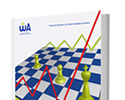A family trust is a useful and powerful tool when used in the right circumstances. That being said, too often they are set up without proper consideration of their utility, costs or setbacks.
Following is a range of thoughts and insights to start the financial year, if you are considering a family trust.
1. They expire!!
If you objective is very long term, intergenerational wealth, a family trust is a less than ideal vehicle as they have an expiry date. An often overlooked or forgotten feature of family trusts is that they have an up to 80 year life expectancy. This is the “Rule against Perpetuities” (there are differences at state levels).
The significance of this, is that at expiry the trust “vests”. The forced transfer of assets out of the trust is a CGT event. It might not be a problem for you but your grandkids are not going to be happy.
2. Over emphasise asset protection
There is a time and place for asset protection strategies, but too often the “price” you pay is more than the “benefit”.
Liability emerges from either a professional activity (your work) of from an “event” (your dog biting someone). In either instance, the discussion surrounding asset protection is a probability play. It may or may not happen. We are generally terrible at assessing probability.
There are certainly some high risk occupations that warrant asset protection considerations (but they are few and far between) and there are some “events” that could give rise to liability (they are even rarer).
What is often forgotten is the hierarchy of events that needs to occur for the asset protection structures to kick in:
- If you are in a high risk occupation, your Professional Indemnity insurance needs to fail. The shield of PI needs to be pierced (very rarely happens)
- If it is an “event” your Liability Policy needs to fail
- In either instance, the claim arrives at your doorstep and you need to decide whether you cover it and avoid bankruptcy or go bankrupt. Depending on the size of the claim, many decide to a negotiated and settled outcome rather than call on the protection of bankruptcy
Embarking on structural contortions (that include trust structures) to pre-empt low probability events is normally a bad idea.
3. Forgetting about Personal Services Income (PSI)
The income received by a family trust would fall into two categories. Investment income or work related. Work related income will usually be considered Personal Services Income and anti-avoidance measures kick in. You will pay tax on that income as if you were an employee.
If you think that a family trust will help you “divert” work income to someone else, you are mistaken.
To find out whether your income is considered Personal Services Income visit the ATO site, there is a lot of good information on the subject. If in doubt, talk to your accountant before you spend any money on a trust.
4. Land Tax
One of the “costs” of owning investment property in a trust is land tax. In NSW you can own up to $432,000 of land in your personal name before Land Tax kicks in ($600,000 in QLD and $250,000 in VIC). But once that same property is owned by a trust your threshold vanishes in NSW and you will pay Land Tax at 1.6% on your total land value or $6,912 per annum on $432,000 land value. In VIC the threshold drops to $25,000 and in QLD to $350,000.
If you think back to the asset protection discussion, you might have a better protected asset in the trust but the “price you are paying for that protection as far as Land Tax is concerned is almost $7,000 p.a. in this example. That might be worth it and it might not.
5. Losses are caught
Both revenue and capital losses are caught within a trust. They cannot be distributed and offset against personal income and gains.
For properties that are negatively geared, this can be a very costly mistake.
6. Read the deed!
Trusts are all about the deed. Whether it is a family trust, unit trust or SMSF (which is also a trust), when in doubt, read the deed and if still in doubt (which you probably will still be) talk to your adviser.
7. 70% tax rate!
Any income above $416 distributed to your lovely 6 year old will be taxed at 70% (68% plus Medicare, 49% above $1,307). Don’t set up a family trust if you think your kids are going to give you any tax relief.
8. Who is the trustee?
When going to the trouble and expense of setting up a trust, don’t be cheap with the trustee.
The cheapest form of a trustee is an individual (you) but that does leave you exposed (if you do value some asset protection). Spend a bit of extra and put in place a corporate trustee, it is best practise and gives you another good extra layer of insulation.
9. To Appointor or not to Appointor, that is the question.
I can hear you asking, who the hell is an Appointor. If you don’t know, go back to your deed and read the deed.
Many people with trusts don’t know or have forgotten that there is someone within the trust who has the power to sack the trustee! They have the ultimate power.
Not all trusts have an Appointor, so the questions that definitely need professional guidance are:
- Do you want one?
- Do you need one?
- Who will it be?
- Will you have more than one?
In conclusion, if you are considering a family trust, take time to weigh up all the pros and cons and get good legal, tax and planning advisers involved.
 |
Want More Tax Effective Strategies?
Get The FREE eBook – The Top 12 Super and Tax Strategies There are some things in life that can’t be avoided. In Australia that includes paying tax and investing in Super. However, as you’ll see from this eBook ‘Top 12 Super and Tax Strategies’ there are things that you can do to work smarter. Download the eBook + |









